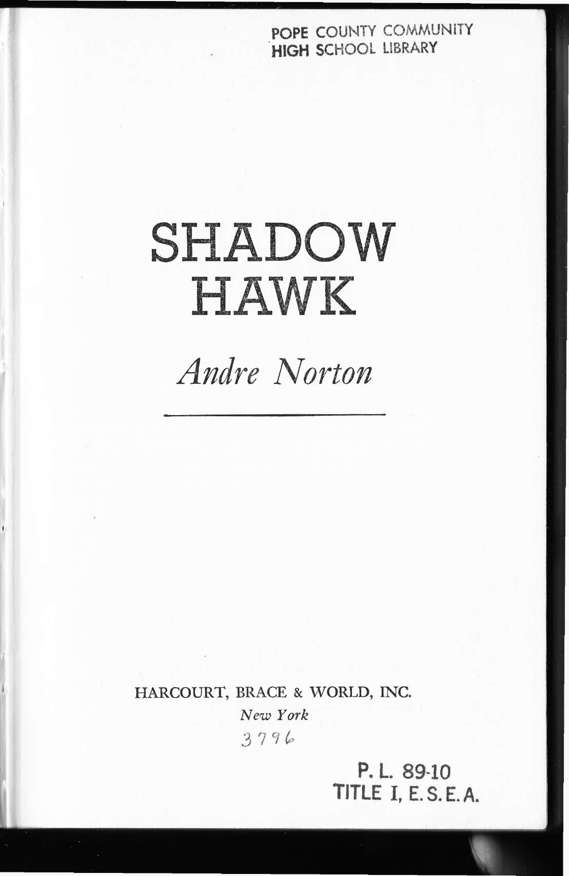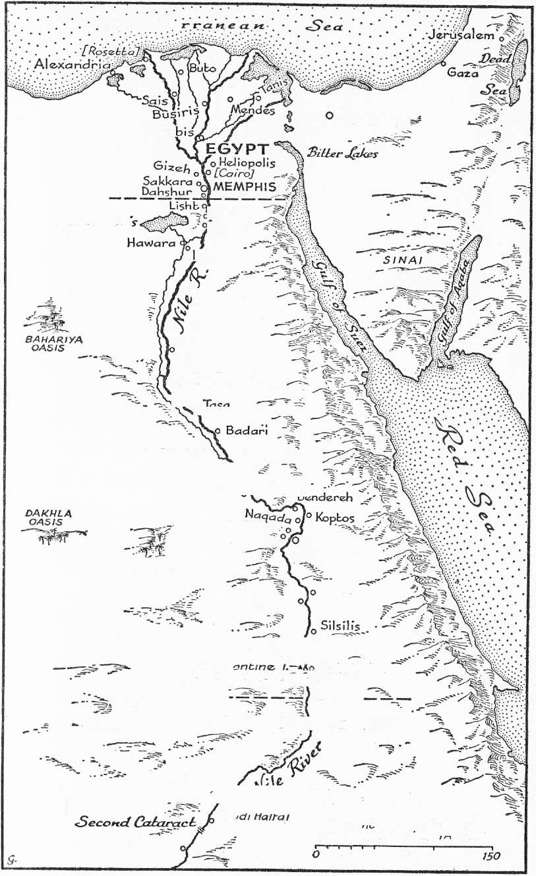Andre Norton - Shadow Hawk
Read Andre Norton - Shadow Hawk Online
Authors: Shadow Hawk
Tags: #Science Fiction, #Juvenile Fiction, #General, #Fiction, #Historical, #Egypt, #Military & Wars, #Ancient Civilizations


© i960 by Harcourt, Brace & World, Inc.
All rights reserved. No part of this book may be reproduced in any form or by any mechanical means, including mimeograph and tape recorder, without permission in writing from the publisher.
c.12.64
Library of Congress Catalog Card Number: 60-10247 Printed in the United States of America
Almost two thousand years before the birth of Christ, a conquering army marched out of the heart of Asia Minor. The conquerors overran other lands and peoples unchecked as they moved westward, for their warriors possessed a new and effective weapon—the horse-drawn chariot. Those who tried to defend their countries against these newcomers were swiftly battered to the dust.
Among the defeated nations was Egypt, already very old and once mighty. So bitter were the Egyptians against the alien invaders that when they were finally able to expel them generations later, they attempted—with excellent results—to erase all trace of their occupation of the Nile Valley. To this day, therefore, we do not know who these Hyksos were, where they came from, or how long they ruled—merely that they held Egypt for a time, introduced the horse to that land, and were accounted worse than devils by its inhabitants. This was a time of intrigue, of danger, of dissension within the ranks of the Egyptians themselves, since the more conservative of the Pharaoh's officials favored a token tribute to the Hyksos and no open break. It was also a time when a young man might dare great things. Highborn Egyptians entered officers' training at about ten years of age and became active combatants at fourteen or fifteen. Both of the royal princes who led the first attacks upon the Hyksos were in their teens.
Only in the far south of Egypt and in Nubia (modern Sudan) did the old Egyptian way of life continue feebly during the years of alien occupation. Nubia—the Land of the Bow, ruled by a viceroy of the Pharaoh—furnished archers
i
11
for the Desert Scouts, a corps famed for over a thousand years in Egyptian records. Their skill was so widely known and respected that in foreign tongues the name for Egyptian was also the word for bowman. And it was in Thebes, the ancient capital of the south, that a successful revolt against the Hyksos took fire in 1590
b.c.
Egyptians, once again united, beat back the enemy and established an empire that dominated the southern Mediterranean for centuries to come.
vt

»• - ■ ■ •
llahun
PENINSULA
^Aicdite.
J^JceMoen
Beni Hasan
THEBES
KHARGA OASIS
El Kab
EdFu
- ■
:
° Kom Ombo
-rV
lanLiniz
/._r*flo
Elephantine oSy^^.-
First Cataract-^.
[A
™
an
l
LAND OF (THE BOW
"SB
[Viadi Haifa]
Prese-nt-day reference, points shown thus ■■ [Aswan]
Se-mha
-Miles

AVAR1S -
t-Ss-
Abhri
LOWER
iGerzeh 'Meidun
O AKHETATON
(Tell-el- Arnarna)
K
t
?=?
'
-NgTasa
^ f
UPPEREGYPT
AbydosVy ri
Delr EI-Bahri. Medineb Habu
Abu Sim bet
.. y
5
' NUBIA
CONTENTS
I car the Seafarer 174
Nebet of Neferusi 186
Over the Walls 199
A Matter of Tribute 2 11
PRINCIPAL CHARACTERS
rauotep
: son of Ptahhotep, who was Viceroy of Nubia, and of his secondary wife, the Lady Tuya, who was heiress of the Striking Hawk Nome (similar to a modern duchy) in Egypt. Since inheritance was through the mother, Rahotep was, by birth, Nomarch (Duke) of the Hawk and of the first rank of nobility, though his lands were now occupied by the Hyksos.
unis
: Rahotep's half brother, son of the Viceroy's Great Wife, the Lady Meri-Mut of a noble Nubian-Egyptian family.
kheti
: Rahotep's foster brother, a Nubian and an underofficer in the Desert Scouts.
methen
: once commander of the Hawk's regiment, a noble who had followed the Lady Tuya to Nubia after the defeat of her father's army.
prince kamose
: "The Royal Heir," eldest son of the Pharaoh and a noted chariot commander. He came to the throne upon the sudden death of his father, and his speech of defiance against his timid council is in existence today. Under his leadership the Egyptian forces won their first victory.
prince ahmose
: his younger brother, who became Pharaoh in turn and founded the great Eighteenth Dynasty, which made Egypt an empire. He was a military genius and a well-qualified ruler who established an unbeatable army and united Egypt in new prosperity.
principal characters
the royal mother, queen teti-sheri:
heiress of the Theban line. Grandmother of Kamose and Ahmose.
the royal wife, queen ah-hetpe:
daughter of Teti-Sheri. According to Egyptian custom, she was the wife of her brother, Sekenenre III, first of the active fighters against the Hyksos. Mother of the Princes Kamose and Ahmose.
prince teti
: "Teti the Handsome" fanned the fires of revolt in Nubia when the Theban rulers marched against the Hyksos, cutting loose the rich southern province and making it his kingdom. He was successful for only a short period. Ahmose crushed his revolt and re-united Nubia to Egypt.
lord nereb
: a high-ranking officer in the newly formed royal army, serving under the Royal Heir, Prince Kamose.
khephren
: "Voice of Amon," high priest in the Temple of Amon-Re at Semna. Since Amon-Re was the patron god of Thebes, his priesthood supported the Theban rulers. Though there were numerous gods in Egypt, Amon-Re, symbolizing the power of life inherent in the sun, was widely reverenced.
tothotep
: "Voice of Anubis," high priest of the Temple of Anubis at Thebes. Anubis was the god who watched over the dead, and his priests defended the tombs and offered sacrifices for those who lay in them. They were rumored to have prophetic powers and in the very ancient days of Egypt had the right to slay ritually a Pharaoh too old or ill to rule.
pen-seti
: priest of Anubis at Semna, uncle of Unis.
vizier zau
: most powerful of all government officials, the Vizier was answerable only to the Pharaoh, and in his hands many of the administrative duties rested. At this time, the Pharaoh could appoint any able man to the post,
principal characters
though formerly it could be held only by his own son.
general sheshang
: officer belonging to the conservative party at the Theban court. Though supreme army commanders had to be of royal blood, able men could rise in the ranks of officers and were to be feared by weak Pharaohs for their power.
Xlll
icar
: sea captain from the northern Mediterranean enslaved by the Hyksos.
1
I
